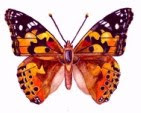You Are An INFP |
 The Idealist You are creative with a great imagination, living in your own inner world. Open minded and accepting, you strive for harmony in your important relationships. It takes a long time for people to get to know you. You are hesitant to let people get close. But once you care for someone, you do so unreservedly and do everything you can to help them grow and develop. In love, you tend to have high (and often unrealistic) standards. You are very sensitive. You tend to have intense feelings. At work, you need to do something that expresses your personal values. You would make an excellent writer, psychologist, or artist. How you see yourself: unselfish, empathetic, and spiritual When other people don't get you, they see you as: unrealistic, naive, and weak |
What's Your Personality Type?
If you take the test and would like a little more detail about your personality portrait, have a browse here. I know that none of these personality type models is perfect and all err toward generalisation, oversimplification, and some pigeon-holing (none of which I particularly endorse as an approach) but I quite enjoy things like this and can live with a few labels. The one above appears to be based on the Myers-Briggs Type Indicator (MBTI) and David Keirsey models. I think?
When I very first took the MBTI (Myers-Briggs Type Indicator) test in my early twenties I came out as an ENFP. And I thought at the time that it was pretty accurate. Surprisingly so actually, as I was initially very sceptical.
I've completed the full questionnaire 3 times subsequently (as part of psychometric evaluations related to recruitment or promotion situations) and at very different phases in my life, under very different circumstance (and dare I say, in different moods) returned a INFP result. And here again, INFP. The little bit of fun above is based on far fewer and less complex questions but it's interesting to me that it returns the same result.
But what about that twenty-something ENFP me? What happened to her? Did she evolve or has she been suppressed? It would appear that I'm fairly certainly a NFP, but how did my E become an I? When I read the two now, I think I might like to be a little more E. And perhaps a bit more STJ would help me out too. I don't know.
Warts & all, I appear to be: INFP (that rhymes quite nicely in my head).
And I'm okay with that.
If you take the test and would like a little more detail about your personality portrait, have a browse here. I know that none of these personality type models is perfect and all err toward generalisation, oversimplification, and some pigeon-holing (none of which I particularly endorse as an approach) but I quite enjoy things like this and can live with a few labels. The one above appears to be based on the Myers-Briggs Type Indicator (MBTI) and David Keirsey models. I think?
When I very first took the MBTI (Myers-Briggs Type Indicator) test in my early twenties I came out as an ENFP. And I thought at the time that it was pretty accurate. Surprisingly so actually, as I was initially very sceptical.
I've completed the full questionnaire 3 times subsequently (as part of psychometric evaluations related to recruitment or promotion situations) and at very different phases in my life, under very different circumstance (and dare I say, in different moods) returned a INFP result. And here again, INFP. The little bit of fun above is based on far fewer and less complex questions but it's interesting to me that it returns the same result.
But what about that twenty-something ENFP me? What happened to her? Did she evolve or has she been suppressed? It would appear that I'm fairly certainly a NFP, but how did my E become an I? When I read the two now, I think I might like to be a little more E. And perhaps a bit more STJ would help me out too. I don't know.
Warts & all, I appear to be: INFP (that rhymes quite nicely in my head).
And I'm okay with that.









.jpg)

.jpg)


No comments:
Post a Comment